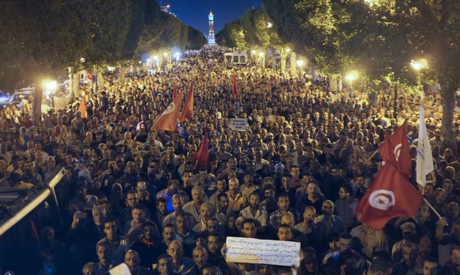
Demonstration in Tunis on 24 October after the murder of seven Tunisian policemen by islamists. (AP)
Negotiations between the Tunisian governing coalition, the opposition, and civil society mediators aiming to solve the political crisis that has crippled Tunisia the past three months began Friday. The negotiations aim at organziing new elections, the formation of a new government consistying of technocrats, and a finished constitution.
Durting their first meeting the representatives agreed on the formation of three committees, each of which will address a key aspect of the roadmap plan,according to Moncef Cheikhrouhou, an NCA member in the Democratic Alliance party. One will handle preparations for elections, another finishing the draft constitution, and a third the formation of a new government.
The talks sarted after Prime Minister Ali Laarayedh of the ruling Ennahda party pledged to resign within the three-week deadline defined in a political roadmap advanced by major civil society groups.
The talks are intended to resolve Tunisia’s political deadlock, which began when opposition politician Mohamed Brahmi was assassinated on July 25. After his death, roughly 60 opposition National Constituent Assembly (NCA) members withdrew from the assembly-halting it’s work. The NCA is set to resume its work, according to press attache Mofdi Mssadi, with withdrawn members returning on Saturday.
''This is the end of the crisis. The assembly members should be able to return Saturday or Monday to finish their work on the constitution," said Nejib Chebbi, an opposition leader.
But deep distrust between Ennahda and the opposition was clear in the protracted wrangling before the talks, and that could still upset negotiations. Talks will likely first name a transitional prime minister to lead the non-partisan government. Deciding the date of the election will be more complicated. Ennahda has said elections will happen in six months, but the opposition may push for a later date to give its leaders more time to prepare.
Ennahda won 40 percent of the seats in Tunisia's first post-Ben Ali vote and it has shared power in a coalition with two smaller secular parties as part of an initial transitional agreement. During its term in power its popularity has slipped, Tunisians say, with many blaming the government for failing to create jobs and keep living costs under control. But the Islamist party is still the most well-organized political movement in Tunisia. Its main rival is Nida Tounes whose ranks include former Ben Ali officials.
Since the fall of Zine al-Abidine Ben Ali, Tunisia has seen a growing split between Islamists and their opponents over the place of Islam. The assassination of two opposition leaders by Islamist militant gunmen this year enraged government critics who blamed Ennahda for being too lenient on Salafist hardliners. For many secular Tunisians that threatens liberal education and women's rights.
The deaths of seven Tunisian policemen on Wednesday in clashes with Islamist militants inflamed tensions and forced a brief postponement of negotiations scheduled for that day. On Thursday residents ransacked several Ennaha offices and took to the streets to demand the government quit.


.jpg)


No comments:
Post a Comment